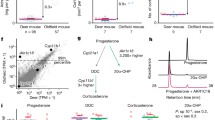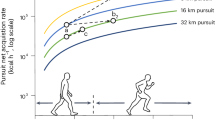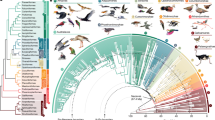Abstract
The 'runaway process of sexual selection' explains the evolution of extreme sexual behaviours and adornments and requires that a preferred secondary sexual character expressed in one sex be genetically correlated with a preference for this character expressed in the other sex1–4. Because of this genetic correlation, individuals selecting the preferred character also select higher levels of preference, producing rapid, self-reinforcing evolution of both characters. Preference for increased development of the secondary sexual character is counterbalanced at equilibrium by natural selection acting against this character. Variation in predation against brightly coloured male guppies, Poecilia reticulata, presents a unique opportunity to test a prediction of this counterbalance between sexual and natural selection, namely that geographical variation in selection against the preferred character should lead to parallel variation in preference5. Here we present evidence that female guppies from high-predation populations show a genetically determined, lower preference for brightly coloured models of male guppies than do females from areas of low predation.
This is a preview of subscription content, access via your institution
Access options
Subscribe to this journal
Receive 51 print issues and online access
$199.00 per year
only $3.90 per issue
Buy this article
- Purchase on Springer Link
- Instant access to full article PDF
Prices may be subject to local taxes which are calculated during checkout
Similar content being viewed by others
References
O'Donald, P. Genetic Models of Sexual Selection (Cambridge University Press, 1980).
Lande, R. Proc. natn. Acad. Sci. U.S.A. 78, 3721–3725 (1981).
Kirkpatrick, M. Evolution 36, 1–12 (1982).
Heisler, I. L. Evolution 38, 1283–1295 (1984).
Lande, R. Evolution 36, 213–223 (1982).
Endler, J. A. Evol. Biol. 11, 319–364 (1978).
Endler, J. A. Evolution 34, 76–91 (1980).
Endler, J. A. Evolution 36, 178–188 (1982).
Endler, J. A. Envir. Biol. Fishes 9, 173–190 (1983).
Stoner, G. & Breden, F. Behav. Ecol. Sociobiol. (in the press).
Reznick, D. & Endler, J. A. Evolution 36, 160–177 (1982).
Breden, F., Scott, M. & Michel, E. Anim. Behav. 35, 618–620 (1987).
SAS User's Guide: Statistics (SAS Institute, Cary, North Carolina, 1982).
Reznick, D. Evolution 36, 1236–1250 (1982).
Houde, A. Evolution 41, 1–10 (1987).
Andersson, M. Biol. J. Linn. Soc. 17, 375–393 (1982).
Sullivan, B. K. Anim. Behav. 31, 1011–1017 (1983).
Bischoff, R. J., Gould, J. L. & Rubenstein, D. I. Behav. Ecol. Sociobiol. 17, 253–255 (1985).
Majerus, M. E. N., O'Donald, P. & Weir, J. Nature 300, 521–523 (1982).
Heisler, I. L. Genet. Res. 44, 133–149 (1984).
Author information
Authors and Affiliations
Rights and permissions
About this article
Cite this article
Breden, F., Stoner, G. Male predation risk determines female preference in the Trinidad guppy. Nature 329, 831–833 (1987). https://doi.org/10.1038/329831a0
Received:
Accepted:
Issue Date:
DOI: https://doi.org/10.1038/329831a0
This article is cited by
-
Genetic segregation for male body coloration and female mate preference in the guppy
BMC Research Notes (2020)
-
Influence of artificial selection for duration of death feigning on pre- and post-copulatory traits in male Tribolium castaneum
Journal of Ethology (2019)
-
Male treefrogs in low condition resume signaling faster following simulated predator attack
Behavioral Ecology and Sociobiology (2016)
-
Living in a risky world: the onset and ontogeny of an integrated antipredator phenotype in a coral reef fish
Scientific Reports (2015)
-
Gene Duplication and Divergence of Long Wavelength-Sensitive Opsin Genes in the Guppy, Poecilia reticulata
Journal of Molecular Evolution (2011)
Comments
By submitting a comment you agree to abide by our Terms and Community Guidelines. If you find something abusive or that does not comply with our terms or guidelines please flag it as inappropriate.



